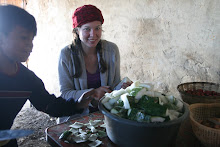
Dear friends,
On October 22, I returned to Guatemala after leaving the service of the Peace Corps to finish up two projects. First, I returned to my village to distribute thirty-seven portraits to students of the sixth grade class there. It was wonderful. The village decorated and prepared a party for me. I felt appreciated and welcomed, something I did not always feel while I lived there. The students received their portraits with great joy, and I felt good about the whole thing. Some of the students from a younger grade danced for us, another young man recited a poem, and afterward we were served cake. It is my dear hope that they will cherish these portraits as a good memory of their childhood forever. I also hope that those who worked on the paintings, to whom I am eternally indebted and unbelievably grateful, understand a little bit more about Guatemala and its inhabitants.
The second thing I finished was completing a purchase of a hearing aid for a young girl in my village. You might remember Doris from an earlier post. I was able to pay for her hearing aid, which her family picked up later that week. I have since spoken to her family on the phone, and they say that Doris’ hearing and speech has already improved. I’m thankful to Living Waters for the World and the Garcia family for working to make that happen.
Now that I have no ties of duty binding me to Guatemala, I have had time to reflect on what it all meant in the grand scheme of things. The past year was difficult, in a lot of ways, but it has left me so filled with gratitude. I’m grateful to my host family during training, for caring for me when I was sick, and for putting up with all of my cultural faux pas and for treating me as nothing less than a member of their own family. I’m grateful for Doña Feliza and Doña Ana, for teaching me some Mam, and maybe saving my life the time I got lost on the side of a mountain. I’m also grateful to a hundred strangers on the bus or in the market who told me to watch my back or offered a smile or an orange on a sad day. Never in my life have I been so indebted to so many people.
I’m also thankful for all of you readers back in the states. Thanks for your comments, your prayers, your positive energy, your donations, your letters—everything. Every postcard or email was monumental to me.
I’m hopeful about the future of Guatemala, not so much because of government aid or because of people like me, living among them for a year, but because of the ingenuity and irrepressible spirit of these people. They have survived 500 years of conquest, a recent genocidal civil war and a currently dysfunctional government. They’ve survived with their native dress and language, though tattered, intact. It is my cautious belief and fervent hope that one day soon they will live up to the promise of Guatemala and their true birthright—peace, justice and prosperity.







